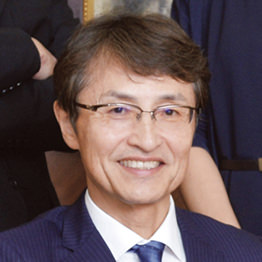SPECIAL FEATURE : ROUNDTABLE DISCUSSION BETWEEN OUTSIDE DIRECTOR AND EMPLOYEES


NO CHANGE, NO GROWTH
MHI is globalizing its management and operations. What are the goals from managerial perspectives? What changes are occurring and what challenges do we have in the workplace? Here we will share a discussion in English between Prof. Ahmadjian (outside director, member of the Board, Audit and Supervisory Committee member) and five members of the Global Finance & Accounting Department.

Accounting Department

Accounting Department

Finance & Accounting Department

Supervisory Committee Member

General Manager, Global Finance &
Accounting Department

Accounting Department
Titles and organization names are as of the date of the roundtable discussion in September 2017.
Globalization is not a goal, but a method
To my mind, a finance department is a group of relatively homogeneous specialists, but the people gathered here today seem to have followed a variety of career paths. What do you think are some of the benefits of having such diversity in the workplace?
We have been working to make our operations more visible and more global. Explaining to people with different career paths how to go about their roles and operational responsibilities in the Global Finance & Accounting Department has made our operations more visible. We have begun using English for internal communications since Ms. Jagoda-Schauwecker joined our team. In that sense, communication has become smoother in the video and telephone conferences we hold with finance subsidiaries around the world.
I agree. It has allowed the Global Finance & Accounting Department to embrace a new form of communication and begin new activities like the global workshop with finance staff members from around the world.
Another big benefit is that it gives employees a higher level of confidence through interactions with overseas members. It also offers various ideas, which broadens our perspectives.
Schauwecker:
When I joined MHI, I encountered new situations almost every day, some of which were challenging. It is not always easy to decide whether differences, for example in working style, are based on the uniqueness of Japanese culture, MHI's culture, or the working culture within my team. In this way, I learn new things every day.
With foreign or mid-career members in the team, it is important that everything is explained clearly and precisely to ensure they are on the same page. While this may seem to be just additional work, it can actually give you a more comprehensive understanding of all your operations, including the tasks you might usually overlook, which then leads to reducing unnecessary errands and making for more efficient operations overall.
Exactly. I believe it ultimately fosters a significant competitive edge for the Company. Globalization is not our end goal; rather it is just one method of growth.
We are only at the beginning
What are your opinions on the current state of globalization in MHI Group?
Well, although the Company has been promoting globalization, we still have a long way to go. Currently, the flow of human resources tends to be one-way; we have many Japanese employees working overseas, but not many foreign employees working in Japan. We need to put more emphasis on making this a mutual exchange.
Many Japanese employees who are currently working overseas may find it difficult to fit back into our conservative corporate culture when they return. Situations like this make it difficult for companies and people to grow. I believe we must create a workplace where everyone can make full use of their skills and capabilities.
Career advancement for women is another important step in promoting globalization. When I joined MHI, I was surprised at how few women were in the Company, and how few opportunities there were for women to voice their opinions during meetings. Creating a culture that embraces a greater diversity of opinions would allow more female employees to actively develop their careers.
By the way, Professor Ahmadjian, you are the only female director, right?
That's right. The other day I was showing my daughter the page with pictures of all the directors and executive officers in MHI Group. She said she was able to pick out my photo immediately, as I was the only woman among the 100 or so on the page. I thought she picked up on a good point regarding the reality of MHI Group.
Indeed, we should embrace diversity in management, as well.
Yes, but don't forget about the more positive and encouraging aspects. MHI Group is promoting globalization and diversity management throughout the organization, and this is only the beginning. What matters most is that we continue to move forward with globalization.
Schauwecker:
I agree. Becoming more global prompts major changes in the environment around us. This has certainly been the case for me. I faced many obstacles at first. Sometimes we may not be sure where to turn, but beyond this change lies growth.


We need to be good cross-cultural communicators
When most Japanese people hear the word “globalization,” we tend to associate it with the ability to speak English. While there is indeed a language barrier, it is imperative that we remind and motivate ourselves to keep trying to make a change.
English capabilities are of course important, but so are abilities to understand different cultures and perspectives. For example, in Japan we often separate employees into “new graduates” and “mid-career hires.” In other countries, by contrast, changing careers is common, and even diversity within one's career is considered to be important, I understand.
Schauwecker:
Another example is the difference in how countries and cultures think of the word “meeting.” In Japan, the word has the context of confirmation or checking, whereas in some countries meetings are considered places for discussion and problem solving.
In other words, rather than being good English speakers, we need to focus on being good cross-cultural communicators.
The first step toward making this change in ourselves is to accept differences. As good cross-cultural communicators, let's turn MHI Group into a strong group. We know it can be done.